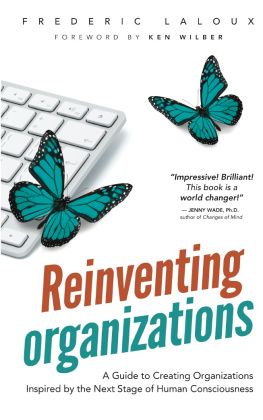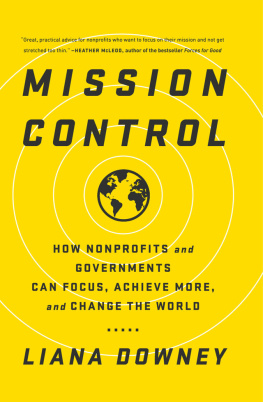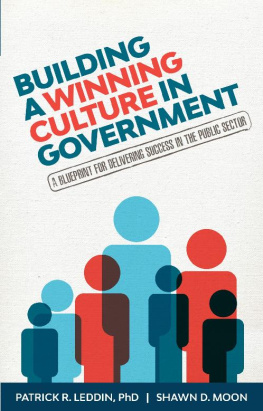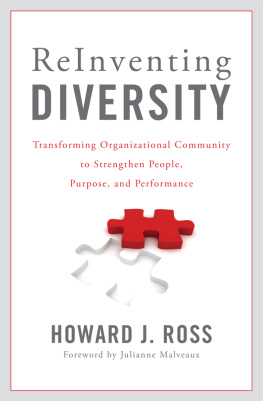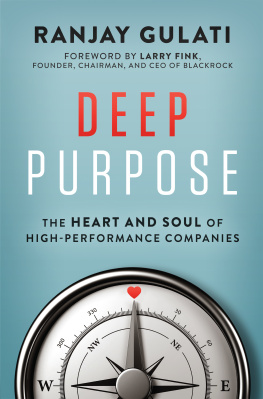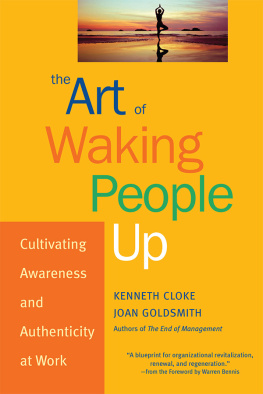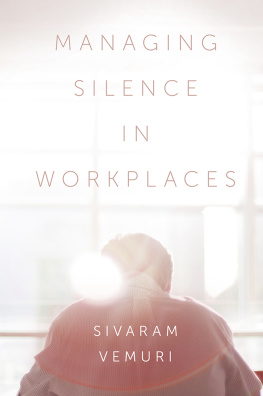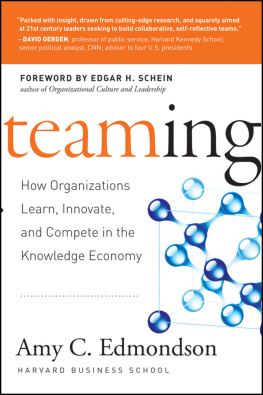Advance praise for Reinventing Organizations
Ground-breaker! Game-changer! Brilliant! The most exciting book Ive read in years on organization design and leadership models. Sustainability? Employee engagement? Innovation? This elegant, parsimonious way of working realizes those aspirations effortlessly while exceeding traditional bottom-line measures and infusing heart and spirit into work without gimmicks. Like a Zen practice, learning to do less takes discipline, and this book shows how letting go gives backto you, your organization, your stakeholders, and the world.
Jenny Wade, Ph.D., Author of Changes of Mind
People have long asked me what a 5th order, or high stage organization would look like in the flesh. Frederic Lalouxs richly researched book is the closest anyone has come, as yet, to answering this question. This is a stimulating and inspiring read!
Robert Kegan, Harvard Universitys Meehan Professor of Adult Learning, and author of In Over Our Heads
A book like Reinventing Organizations only comes along once in a decade. Sweeping and brilliant in scope, it is the Good To Great for a more enlightened age. What it reveals about the organizational model of the future is exhilarating and deeply hopeful.
Norman Wolfe, Author of The Living Organization
Frederic Laloux has done business people and professionals everywhere a signal service. He has discovered a better future for organizations by describing, in useful detail, the unusual best practices of today.
Bill Torbert, Author of Action Inquiry
Frederic Lalouxs Teal Organization is as close a model to what I call a conscious organization as I have seenan organization and a culture that not only thrives in the unfolding paradigm of collective thought but helps in the unfolding. It could serve as the mid-wife for a new worldview that will allow humankind to consciously evolve to a level where the world works for everyone.
John Renesch, futurist, founder of FutureShapers, LLC and author of 14 books, including The Great Growing Up
As the rate of change escalates exponentially, the old ways of organizing and educating, which were designed for efficiency and repetition, are dying. Frederic Laloux is one of the few management leaders exploring what comes next. Its deeply different.
Bill Drayton, Founder, Ashoka: Innovators for the Public
REINVENTING ORGANIZATIONS
A Guide to Creating Organizations
Inspired by the Next Stage
of Human Consciousness
Frederic Laloux

Copyright 2014 by Frederic Laloux.
First edition.
ISBN : 978-2-960133-53-0
All rights reserved. No parts of this book may be used, reproduced, stored in or introduced into a retrieval system, or transmitted, in any forms, or by any means (electronic, mechanical, photocopying, recording, or otherwise) without written permission of the publisher, except in the case of brief quotations embodied in critical reviews and certain other noncommercial uses permitted by copyright law.
Please purchase only authorized electronic editions, and do not participate in or encourage electronic piracy of copyrightable materials. Your support of the authors rights is appreciated.
Published by NELSON PARKER.
Nelson Parker is a trademark of Unfolding sprl.
54 Serbia Street, Brussels 1190, Belgium
Quantity sales: Special discounts are available on quantity purchases of the electronic format of this book. For details, contact the publisher.
This book is published in a variety of book formats. Some material included with standard print versions of this book may not be included in the electronic format.
Foreword
This is a very important book, deeply significant in many ways, as much for the pioneering research, insights, guidelines, and suggestions that it makes as for the many equally important questions and issues that it raises. It is, without doubt, on the leading-edge of a type of work we are seeing more and more of at this time: namely, that concerned with the extremely profound changes in consciousness, culture, and social systems that we are seeing emerge, in increasing numbers, at this point in human (and, indeed, cosmic) evolution. Frederic Lalouxs work focuses specifically on the values, practices, and structures of organizationslarge and smallthat seem to be driven by this extraordinary transformation in consciousness occurring around the world. He offers a very detailed and practical accountwhat amounts to a handbook, reallyfor people who feel that the current management paradigm is deeply limiting and yearn to bring more consciousness to the way we run organizations but wonder if it is possible and how to do it.
The book is highly practical, but dont be mistaken: it is solidly grounded in evolutionary and developmental theory. Books describing the broader transformation of consciousness, not just in organizations but in society, have appeared for at least three decades now, going back to such pioneering works as The Aquarian Conspiracy, The Turning Point, The Greening of America, and so on. But there is a major, indeed profound, difference: development studies continue to indicate, with increasing certainty, that what has generally been thought of as a single major transformation in consciousness and culture in the last four or five decades actually contains two major transformations, emerging successively, and known variously as pluralistic and integral, individualistic and autonomous, relativistic and systemic, HumanBond and Flexflow, green and teal, and order 4.5 and order 5.0, among many others. And, as developmentalists are increasingly discovering, these two transformations are simply the latest two in a long line of consciousness transformations that, slightly modifying the terms of Jean Gebser, for example, are called Archaic, Magic (Tribal), Mythic (Traditional), Rational (Modern), Pluralistic (Postmodern), and Integral (Post-postmodern).
Each of these stages of development occurred to humanity as a whole, and repeats itself in essentially basic ways in individuals today, with everybody starting at stage one and proceeding essentially up to the average level of development in his or her culture (with some individuals lower, some higher). Each of these general stages has a different set of values, needs, motivations, morals, worldviews, ego structures, societal types, cultural networks, and other fundamental characteristics. The two basic transformations that I referred to above are the last two in the series: the Pluralistic stage, emerging in the 1960s and marking the beginning of Postmodernism, and more recently (and still much more rarely) the Integral stage, newly emerging, and marking the beginning of the phasewhatever it may turn out to bethat is moving beyond Postmodernism and its basic tenets.
The profound difference I was alluding to is this: most earlier books heralding a transformation of society speak from a Postmodern perspective, and have a rather simplistic view of human evolution. Lalouxs book speaks from an Integral perspective and is grounded in a sophisticated understanding of evolutionary and developmental theory and what in Integral theory is called AQAL (all quadrants, all levels).
Postmodernism, as the name suggests, is that general phase of human development that came after, and in many cases strongly criticized, the previous general phase of Modernism, which began in the West with the Renaissance and then fully blossomed with the Enlightenmentthe Age of Reason and Revolution. What Enlightenments modernity brought to the scene was a move beyond the previous mythic-literal, religious, traditional era of developmentwhere the Bible was the one source of literal, uncontested truth; humanity had one, and only one, savior; and no one comes to salvation save by through the Mother Church, whose dogmas delivered truth on all subjects, artistic to normative to scientific to religious. With the Enlightenment, representative democracy replaced monarchy; freedom replaced slavery (in a 100-year period, roughly 1770-1870, every rational-industrial society on the planet outlawed slavery, the first time this had ever happened to any societal type in human history); the experimental modern sciences replaced the revelatory mythic religions (as sources of serious truth); and what Weber called the differentiation of the value spheres (the differentiation of art, morals, and science, so that each could pursue its own logic and its own truths outside of their fusion in the dogma of the Church; where the Churchmen refused to even look through Galileos telescope, researchers by the hundreds and eventually thousands began to do so, with an explosion in all of what are now referred to as the modern sciencesgeology, physics, chemistry, biology, psychology, sociology).

